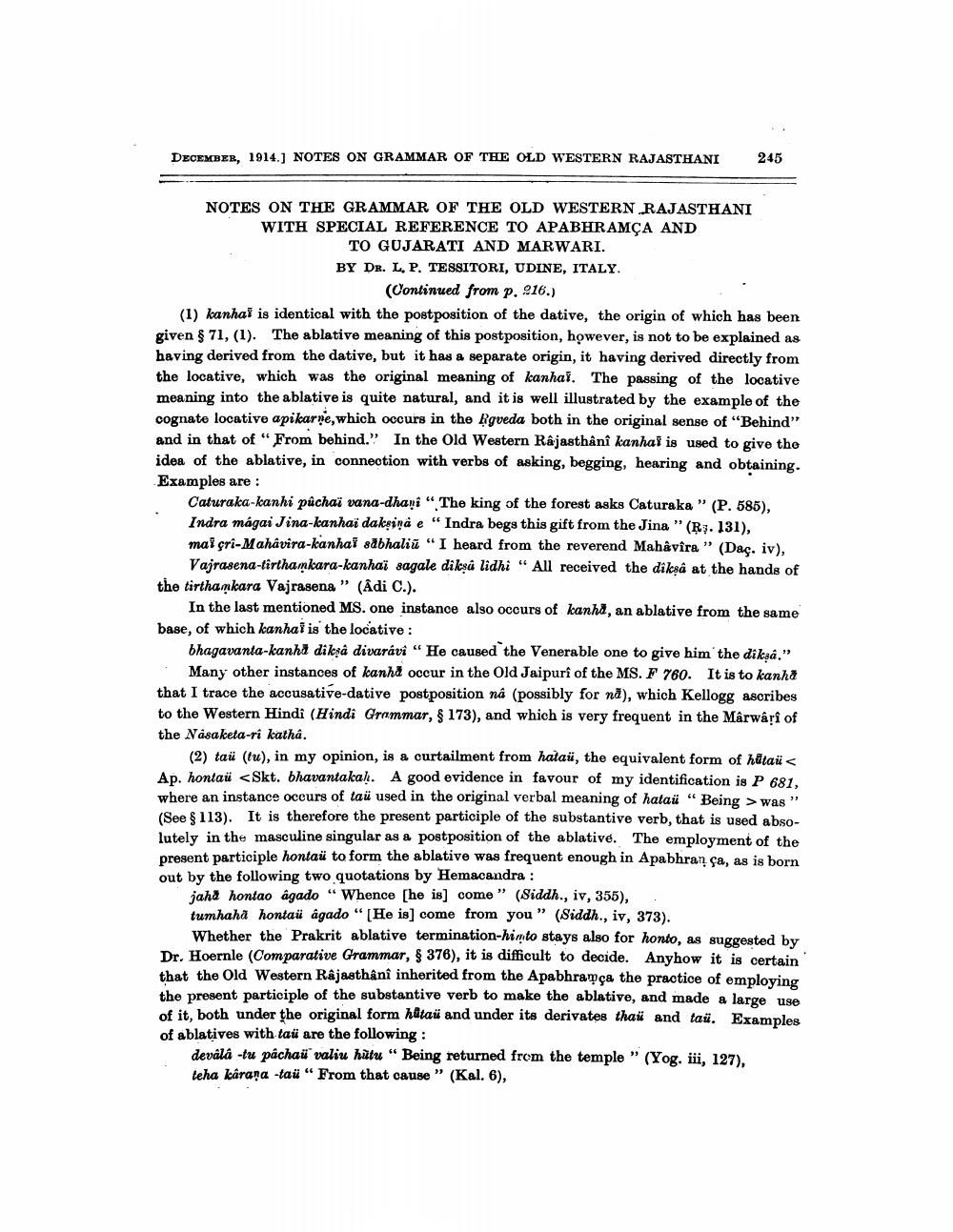________________
DECEMBER, 1914.] NOTES ON GRAMMAR OF THE OLD WESTERN RAJASTHANI
NOTES ON THE GRAMMAR OF THE OLD WESTERN RAJASTHANI WITH SPECIAL REFERENCE TO APABHRAMÇA AND TO GUJARATI AND MARWARI. BY DR. L. P. TESSITORI, UDINE, ITALY.
(Continued from p. 216.)
245
(1) kanhal is identical with the postposition of the dative, the origin of which has been given § 71, (1). The ablative meaning of this postposition, however, is not to be explained as having derived from the dative, but it has a separate origin, it having derived directly from the locative, which was the original meaning of kanhal. The passing of the locative meaning into the ablative is quite natural, and it is well illustrated by the example of the cognate locative apikarne, which occurs in the Rigveda both in the original sense of "Behind" and in that of "From behind." In the Old Western Rajasthanî kanhal is used to give the idea of the ablative, in connection with verbs of asking, begging, hearing and obtaining. Examples are:
66
Caturaka-kanhi pûchaï vana-dhani "The king of the forest asks Caturaka" (P. 585), Indra mágai Jina-kanhaï dakṣina e Indra begs this gift from the Jina "(R. 131), mai çri-Mahavira-kanhal sabhaliu "I heard from the reverend Mahavira" (Daç. iv), Vajrasena-tirthankara-kanhaï sagale dikṣa lidhi "All received the dikṣâ at the hands of the tirthankara Vajrasena" (Adi C.).
In the last mentioned MS. one instance also occurs of kanha, an ablative from the same base, of which kanhal is the locative:
bhagavanta-kanha diksâ divaravi "He caused the Venerable one to give him the dikṣa."
Many other instances of kanha occur in the Old Jaipurî of the MS. F 760. It is to kanha that I trace the accusative-dative postposition nâ (possibly for na), which Kellogg ascribes to the Western Hindi (Hindi Grammar, § 173), and which is very frequent in the Mârwârî of the Nåsaketa-ri kathâ.
(2) tai (tu), in my opinion, is a curtailment from hałaü, the equivalent form of hatai< Ap. hontau <Skt. bhavantakaḥ. A good evidence in favour of my identification is P 681, where an instance occurs of tau used in the original verbal meaning of hatau "Being > was " (See § 113). It is therefore the present participle of the substantive verb, that is used absolutely in the masculine singular as a postposition of the ablative. The employment of the present participle honta to form the ablative was frequent enough in Apabhran ça, as is born out by the following two quotations by Hemacandra :
jaha hontao âgado "Whence [he is] come" (Siddh., iv, 355),
tumhaha hontaü âgado "[He is] come from you" (Siddh., iv, 373).
Whether the Prakrit ablative termination-hinto stays also for honto, as suggested by Dr. Hoernle (Comparative Grammar, § 376), it is difficult to decide. Anyhow it is certain that the Old Western Rajasthânî inherited from the Apabhramça the practice of employing the present participle of the substantive verb to make the ablative, and made a large use of it, both under the original form hata and under its derivates thai and tau. Examples of ablatives with tau are the following:
devâlâ -tu pâchau valiu hutu "Being returned from the temple" (Yog. iii, 127), teha karana -tau "From that cause" (Kal. 6),




